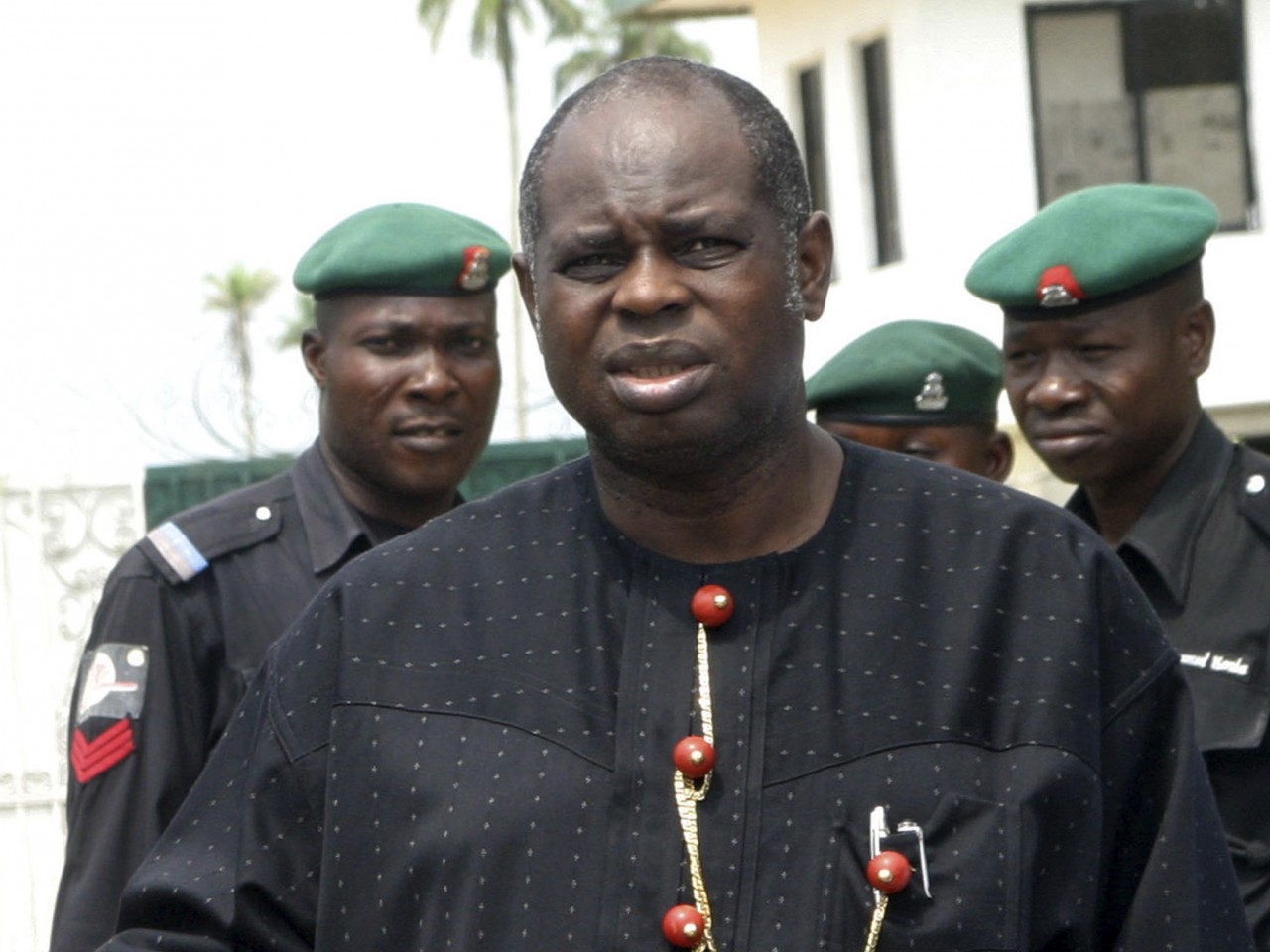The news of the shocking death of the former governor of Bayelsa State, Chief DSP Alamieyeseigha, broke in the afternoon of October 10, 2015.
From available records, Alamieyeseigha would have been 63 in a month’s time, specifically on November 14 this year. In a country where life expectancy stands at less than 55 years, according to the most recent World Health statistics, one could still say that at 63, the former governor would be counted lucky, especially realising the fact that this world is not a permanent abode for any mortal.
Even then, questions have been raised on whether Alamieyeseigha died a natural death, or he was unduly hounded out of this world as a result of the actions or inactions of some powerful individuals or authorities.
Perhaps, a short historical account will help us out. In 2005, some state governors were suspected to be working with the then Vice President Atiku Abubakar against the re-election ambition of the former President Obasanjo.
Without properly investigating this allegation, the Nuhu Ribadu-led Economic and Financial Crimes Commission (EFCC) was deployed to cage them. Pronto, charges of corruption were trumped up against the governors, and some of them got impeached under strange circumstances. Later, the courts were to pronounce their innocence and annul the impeachment as a demonstration of the fact that any action anchored on injustice would ultimately suffer a reversal.
It is instructive that many of the governors who were dubiously removed from office like Senator Joshua Dariye, Senator Chris Ngige and Governor Ayodele Fayose are all back to reckoning, occupying important positions of trust in the nation.
In the case of Alamieyeseigha, Obasanjo laboured to do him in without success. He therefore leveraged his contacts in the United Kingdom to put him under watch after giving him a bad name. This subsequently resulted in his arrest in London on charges of money laundering.
Expectedly, prosecuting Alamieyeseigha became a difficult task, even for the UK authorities as they searched his home repeatedly, only to see less than 70, 000 pounds, for which they laboured to find a section of their law under which he was charged to court.
For some strange and inexplicable reasons, Alamieyeseigha jumped bail and returned to Nigeria. Still towing a vindictive path, Obasanjo obligated the helpless Bayelsa State House of Assembly to impeach him.
His reason was that since he jumped bail in the UK, he had become a fugitive unworthy of holding public office. Alamieyeseigha was subsequently arrested by Ribadu’s EFCC.
Curiously, the British authorities did not request for the extradition of Alamieyeseigha to continue his trial throughout the period he was being detained by the anti-corruption body. Eventually, he was prosecuted by the EFCC, and following a plea bargain, he was released after several years.
The claim that former President Jonathan protected him is indeed preposterous and a non issue. The whole of 2006, up to mid 2007 that Alamieyeseigha was with the EFCC, Jonathan was still the governor of Bayelsa State with no control of federal government agencies. Even when Jonathan came to Abuja, he was the vice president from mid 2007 to 2010, thus could not have prevented federal government agencies from extraditing Alamieyeseigha if the United Kingdom wanted him.
It is curious that 10 years after, the UK authorities wanted Alamieyeseigha extradited as claimed by Prof. Itse Sagay, a Senior Advocate of Nigeria (SAN). I am not a lawyer and will not dwell on the merit of the law, but I know that certainly, criminal offences are not statute barred.
ALSO READ: Alaamieyeseigha: UK High Commission Denies Presenting Extradition Request To Buhari
Clearly, there are social and ethical questions we need to address. If Alamieyeseigha had a strong case of money laundering, why was it that the UK authorities never asked for his extradition when he returned to Nigeria, especially when he was being detained by the EFCC?
If he jumped bail as alleged, why was it that the UK authorities did not ask the EFCC to send him back to the UK to face the law?
If he actually smuggled himself out of detention in the UK as was purported, how come no UK official was either queried or punished for negligence and laxity? I am not aware that the UK authorities ever investigated the escape of such high profile detainee from prison.
Why would the UK suddenly develop interest in reopening Alamieyeseigha’s money laundering case for a figure not exceeding 70, 000 pounds, and demanding his extradition 10 years later? And that is coming after he had been duly jailed by a court of competent jurisdiction in Nigeria and subsequently obtained presidential pardon?
ALSO READ: FG Is Killing Ijaw People – Annkio Briggs Says Alaamieyeseigha Was Tortured To Death
It is instructive that during the declaration of Governor Seriake Dickson for a second term, Alamieyeseigha made statements that may have been considered provocative to some people. He also granted newspaper interviews on issues that might not have gone down well with some powerful people.
Many pan-Ijaw groups have demanded explanation on the federal government’s fanatical disposition towards releasing to another country, a citizen of Nigeria who had been tried, convicted and later pardoned in accordance with the laws of the country.
Could it really be that the late Alamieyeseigha posed a threat to those who would want to win the Bayelsa gubernatorial election at all cost? I have no evidence that these claims are true. But the foregoing is indeed a wakeup call for the South-South, especially the Ijaw nation, and all the people who are being marginalised, humiliated and treated as second-hand citizens.
Jackson Ola, a public affairs commentator, contributed this piece from Yenagoa in Bayelsa State.
The opinions expressed in this article are solely those of the author.







